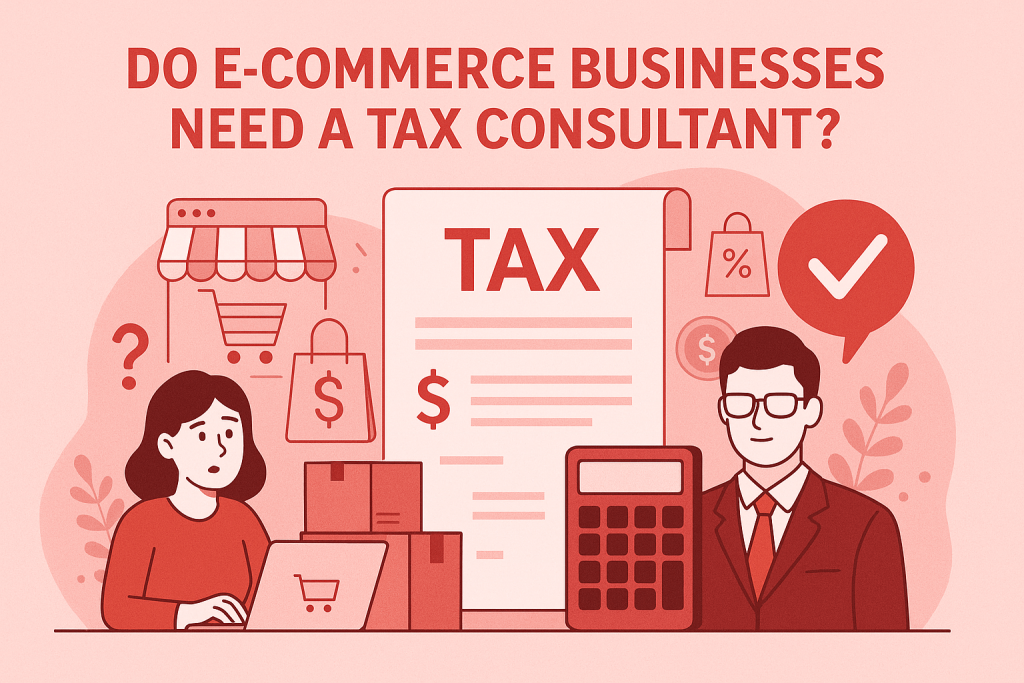Do E-Commerce Businesses Need a Tax Consultant?

Ecommerce businesses are nowadays flourishing rapidly and providing revenue in massive amounts .Although these businesses target enormous opportunities and have adhesive growth scales. However one area always makes it challenging even for the most seasoned seller and that is tax compliance. If you are not experienced or have less knowledge about Tax filing it will turn challenging, here is when an Ecommerce tax consultant’s requirement jumps in.
Understanding Tax obligations gets tricky when you already have too many business related tasks on your plate. Ecommerce is a massive cross-border and multi-platform industry, handling domestic and international tax requirements on your own can drag you into complexities. Let’s ease this question by exploring the benefits and requirements of hiring an Ecommerce tax consultant.
Why Do E-Commerce Businesses Have to Pay Taxes?
Even though E-commerce operates online, it still involves real money, products, and services just like traditional businesses. In the same way E-Commerce businesses are operated across different jurisdictions, and sales tax gets implemented based on where the customer lives. Additionally, business income is subject to federal, state and possibly self-employment tax if you are a sole proprietor.
Here’s why E-Commerce businesses are legally required to pay taxes:
Sales Tax on Transaction
If a person is selling goods online, especially physical products, then they are subjected to collect sales tax from customers based on their location. These taxes are passed to the government to avoid all legal issues.
For instance; your business is located in California and a customer from New York purchased your product. Then you have to collect the sales tax according to the New York laws, not your own state.
Income Tax on Profits
Online businesses also abide by the rule to pay income tax on the profits they earn, just the way traditional businesses do. Tax authorities in USA like IRS have directed all businesses whether sole proprietors, LLC or Corporation to report for income tax
Use Tax
In U.S some states have “Use Tax” which says the buyer is responsible for paying tax even if the seller did not collect it from you. To avoid this hassle most of the states instructed the online sellers to get registered and collect sales tax which can be efficiently done by an ecommerce tax consultant.
Wayfair v. South Dakota (2018)
Before 2018, if businesses have physical appearance only then they have to collect sales tax in a state. But following this law states can require businesses to collect sales tax now based on economic activity, not just physical location. This act is referred to as “Economic nexus.” This law affects sellers on Amazon, Shopify, Etsy, eBay, and more.
Market Place Facilitator Law
In many states, platforms like Amazon or eBay have to collect and remit sales tax on behalf of the seller. Even if the platform is handling taxation, the business still needs to file its tax reports.
International VAT/GST Law
If you sell to international customers in other countries (Uk, Canada, EU or Australia especially), you must
- Get registered for VATor GST
- Collect or pay the correct value added taxes
- File cross-border tax returns
If the businesses do not comply these laws they might face fine or get bans from marketplace, or result in confiscated good at customs
E-Commerce Tax Consultant Can Streamline Your Business
Hiring a tax consultant is more than just tax filing. It helps you to get involved in a long-term investment in compliance, efficiency, and peace of mind. Here’s how they support your online business:
- Navigate Complex Tax Law
Tax laws are constantly changing especially in e-commerce. Having a Consultant may ease you understand:
- Sales tax nexus rules in each state or country
- VAT compliance for international sales
- Proper handling of digital product taxation
- Reporting for multi-channel platforms (Amazon, eBay, Shopify, etc.)
They ensure you’re collecting the correct taxes, at the right rates, from the right locations.
- Optimize Deductions and Credits
Many e-commerce owners miss out on legitimate deductions, such as:
- Web site hosting fees
- Online advertising (Facebook, Google Ads)
- Inventory storage and shipping costs
- Office or home workspace expenses
- Software subscriptions and tools
Tax professionals know where to look and how to maximize your refund or reduce your tax liability legally.
- Prevent Costly Errors and Penalties
If your tax filing have mistaken they can trigger serious consequences:
- Failure to File Penalty: Up to 25% of unpaid taxes
- Late Payment Penalty: 5% per month (up to 25%)
- Negligence Penalty: Up to 20% for careless or inaccurate filings
- Interest Charges: Compounded daily on unpaid balances
A tax consultant works hard to make sure every figure you report is accurate. They keenly review your records, correct common errors, and make sure deadlines are never missed.
- Manage Quarterly and Seasonal Tax Planning
E-commerce is rarely steady—it spikes during holidays, sales events, or product launches. A consultant will:
- Estimate and file quarterly taxes
- Help you save during high-revenue months
- Ensure you’re not underpaying, which could trigger IRS penalties
Their planning keeps your business aligned with tax laws year-round.
When Should You Hire an E-Commerce Tax Consultant?
Here are scenarios where hiring a tax consultant becomes not just helpful, but essential:
- You sell in multiple U.S. states or countries
- You’ve crossed economic nexus thresholds (e.g., $100K in sales or 200+ transactions in a state)
- You’re unsure about platform tax settings
- You’ve received a tax notice or audit request
- You plan to expand internationally
- You offer digital products or services with unique tax rules
If any of these apply to you, the value a consultant brings will likely outweigh the cost.
Results of Hiring an E-Commerce Tax Consultant
- Accurate Nexus Evaluation
A tax consultant can assess where your business has tax obligations and help you register for sales tax permits in the necessary states or countries. This ensures you’re compliant and avoiding penalties.
- Customized Platform Integration
Consultants optimize your tax settings across platforms like Shopify, Amazon, WooCommerce, and more. They help configure tax collection correctly based on your products, shipping destinations, and applicable rules.
- Improved Compliance
Tax laws change frequently. A consultant stays up to date with these changes and ensures your business is always compliant saving you from audits, late fees, and unnecessary interest charges.
- International Selling Made Simple
A tax consultant simplifies complex VAT/GST rules and can advise you on whether to register for foreign tax IDs, how to invoice internationally, and when to charge tax.
- Time Savings
Handling multi-jurisdiction tax requirements is time-consuming. A consultant frees you up to focus on growing your business, not filling out forms or reconciling tax reports.
- Strategic Financial Planning
Some consultants—especially those offering CFO services can help you with broader financial planning, forecasting, and choosing tax-efficient business structures.
What Happens If You Avoid a Tax Consultant and Prefer DIY?
Many new e-commerce sellers attempt to handle taxes on their own using DIY software or spreadsheets. While this might seem cost-effective, it can lead to bigger problems later.
- Increased Risk of Penalties
According to the IRS, over 5 million small businesses pay penalties each year for filing or payment errors. Some examples include:
- Filing incorrect sales tax returns due to misunderstanding state nexus laws
- Forgetting to report income from digital sales or international customers
- Mixing personal and business expenses, which raises red flags during audits
These mistakes can cost thousands in penalties, interest, and potential audits.
- Stress and Time Drain
Managing your own taxes involves tracking:
- Income from multiple platforms
- Sales taxes per region
- Expenses, receipts, and invoices
- Monthly, quarterly, and annual filings
This can take up 10–20 hours per month, time better spent on growing your business.
- Lack of Strategic Growth Planning
Tax consultants don’t just file taxes—they help plan your future. If you want to:
- Form an LLC or S-Corp
- Expand internationally
- Hire employees or contractors
- Accept investment or venture capital
You’ll need professional tax guidance. Doing it alone could stall your growth or expose you to legal risks.
- Real Industry Insight: Why People Trust Tax Consultants
According to a 2024 survey by Statista, 67% of small online retailers said hiring a tax consultant helped:
- Improve their profit margins by 20–30%
- Avoid late filing fees and interest
- Understand how to properly collect multi-state sales taxes
This isn’t just about peace of mind it’s about protecting and scaling your business.
Conclusion:
Whether you’re running a Shopify store with international customers or a growing Amazon FBA operation, chances are you’re juggling tax obligations in multiple jurisdictions. A tax consultant keeps you compliant, Saves you time, Helps avoid costly errors and sets you up for sustainable growth. Think of it as an investment in the long-term health and scalability of your business. Tax compliance is a critical part of running a successful e-commerce business but it’s often neglected until problems arise. Hiring an experienced e-commerce tax consultant might seem like a luxury at first, but in most cases, it’s a smart, proactive step toward protecting your business from costly missteps.

